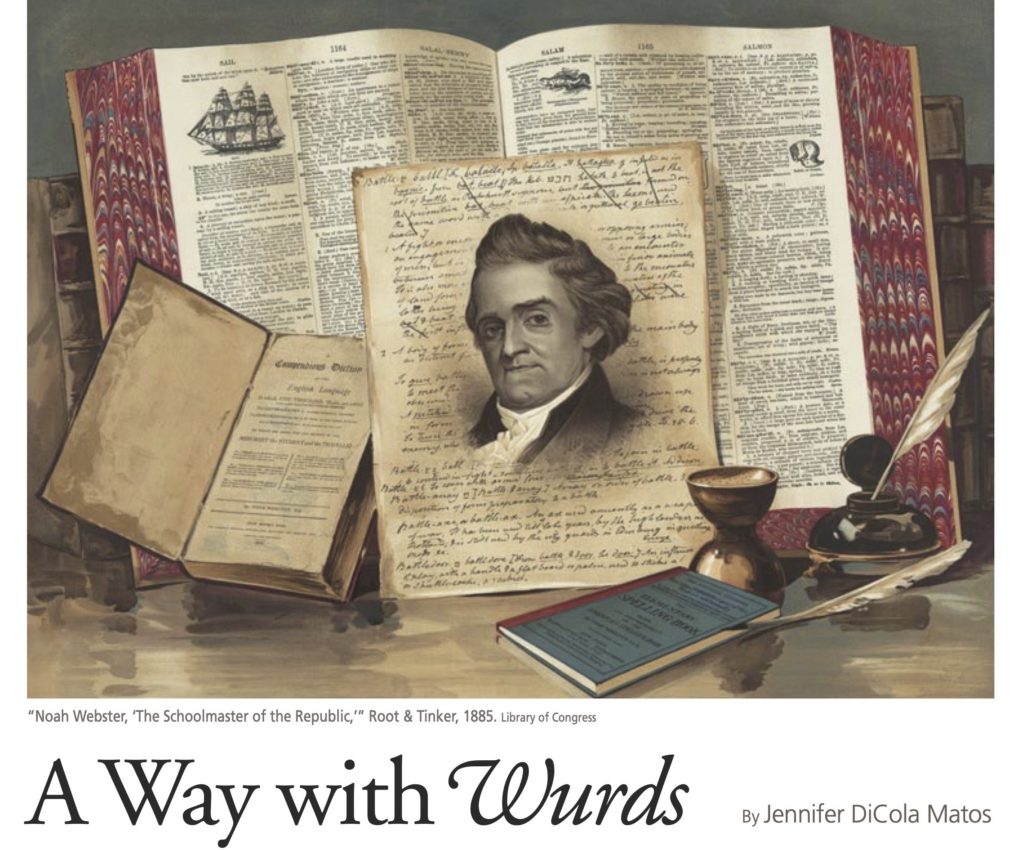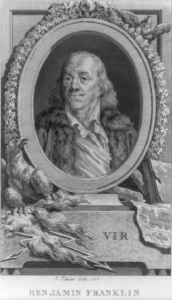(c) Connecticut Explored Inc. Winter 2020-2021
Subscribe/Buy the Issue!
On February 13, 1786, Noah Webster, 27 years old, arrived in Philadelphia to give a lecture. The Yale graduate and school teacher had gained wide recognition in 1783 for his Grammatical Institute of the English Language (a.k.a. “The Blue-backed Speller”). The Speller was designed to teach America’s children how to read and write—and how to be American—at a time when the United States had just won its independence from Great Britain.
Webster gained an introduction to the octogenarian and national hero Benjamin Franklin. Webster needed Franklin’s approval to offer his “Lectures on the English Language” at the College of Philadelphia, which Franklin had founded. Franklin had first gained success by publishing a British spelling book, Thomas Dilworth’s New Guide to the English Tongue, in 1740. Despite their vast difference in ages, Franklin and Webster quickly discovered that they shared a love of language and had both dabbled in spelling reform.
In 1768 Franklin had published a Scheme for a New Alphabet and a Reformed Mode of Spelling that eliminated c, w, y, and j and added six new letters and multiple diagraphs (compound letters). Franklin’s plan had not been successful, but when he met Webster he recognized a kindred spirit. “This indefatigable gentleman … has honored me with the offer of the manuscripts and types, and expressed a strong desire that I should take these types & prosecute a plan,” Webster wrote, as Harlow Unger documents in Noah Webster: The Life and Times of an American Patriot (John Wiley & Sons, 1998).
Webster was flattered, as he noted in his unpublished memoir now in Yale University’s Sterling Memorial Library archives, but had concerns about Franklin’s plan, believing spelling reform, rather than a change in the alphabet, was more palatable to the American public. In his Speller, Webster had challenged traditional spellings, especially those he viewed as particularly British, believing the young nation needed its own language [See “Accent on an American Language,” Spring 2006.] Webster removed superfluous and silent letters from words such as humour,publick, and waggon. He changed the ending of words like centre to er. Webster began to implement simplified spelling for words like gaol (jail) and draught (draft).
Still, Webster was aware that a connection with Franklin would be good for his career and sales of the Speller. He agreed to implement some of Franklin’s reforms in the next edition, and he worked on a new plan for American English, which he presented to Franklin in May 1786.
During the next three years, Webster and Franklin met to finesse the details of their plan. Their work was published as Dissertations on the English Language in May 1789. At its heart was a set of simplified and often phonetic spellings that Webster believed would ease pronunciation differences between “all persons of every rank” and enable Americans to “speak with some degree of precision and uniformity.” This uniformity “…would remove prejudice, and conciliate mutual affection and respect.”
Webster took further measures to root out unnecessary letters. Words like bread and friend would become bred and frend. Words with silent endings like give lost the e to become giv. Webster advised against double consonants in verbs with unaccented final syllables that resulted in words like cancelled becoming canceled. He also removed letter combinations such as ie and ea that had ambiguous sounds. Words like speak became speek. For the soft ch sound, Webster favored sh (masheen instead of machine), and k for the hard ch sound (korus instead of chorus). He simplified spellings to mirror how the word was pronounced, thus tough turned into tuf. Franklin was pleased with Dissertations. But these latest spelling reforms generated little response.
Franklin died in April 1790, and Webster gave spelling reform one more try. In June 1790 he published A Collection of Essays and Fugitiv Writings in which he used his new system of spelling. “Every possible reezon that could ever be offered for altering the spelling of wurds,” he wrote, “stil exists in full force; and if a gradual reform should not be made in our language, it will proov that we are less under the influence of reezon than our ancestors.”
He changed the spelling of some words, and yet he left some words unchanged, such as could and would. Webster’s latest “plan” felt a bit arbitrary. It received more attention than the first—more criticism than anything else. Webster conceded that he was “doubtful whether the public mind is prepared for a reformed plan of spelling.”
Some of Webster’s spelling reforms did become the standard for American English. The reason may lie in Webster’s Speller, which was used by millions of American children and may have been far more influential than he realized. If he and Franklin had incorporated more of their spelling reform in it, wurds as we spell them today might be vastly difrent.
Jennifer DiCola Matos is executive director of The Noah Webster House and West Hartford Historical Society. She last wrote, “The Iceman Cometh (and Goeth),” Spring 2019.
Explore!
Noah Webster House & West Hartford Historical Society
227 South Main Street, West Hartford
860-521-5362; noahwebsterhouse.org
Find more stories about Noah Webster on our Notable Connecticans TOPICS page
GO TO NEXT STORY


